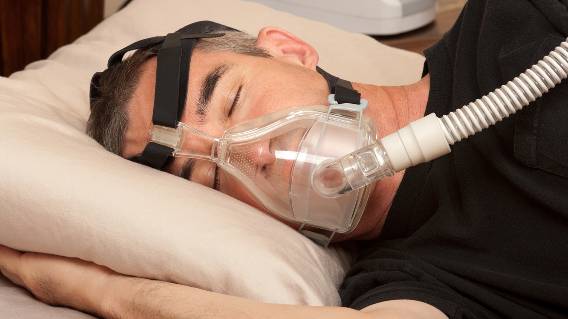
Philips Respironics issued a recall for hundreds of bi-level positive airway pressure devices, also known as BiPAP devices, adding to the millions of CPAP, BiPAP and ventilator machines already recalled in June 2021.
Doctors prescribe BiPAP machines to people with sleep apnea, those who cannot get enough oxygen when they breathe or people with respiratory failure. The devices work by using higher pressure when users inhale and lower pressure when they exhale.
Philips issued the recall for potentially contaminated plastic parts in device motors. These parts may contain a noncompatible material that could release toxic volatile organic compounds or cause the machine to suddenly fail, according to a U.S. Food and Drug Administration safety communication.
The FDA reported the recall affects about 1,660 BiPAP devices globally. Philips distributed 386 of the recalled machines to the U.S. between Aug. 6, 2020, and Sept. 1, 2021.
Recalled Philips BiPAP machines include:
- A-Series BiPAP A30 (Ventilator)
- A-Series BiPAP A40 (Ventilator)
- A-Series BiPAP V30 (Auto Ventilator)
- OmniLab Advanced+
Some of these devices were already included in the June 2021 CPAP, BiPAP and ventilator recall for potentially defective PE-PUR foam, but this recall is not related to degrading sound abatement foam issues.
Exposure to toxic compounds released from contaminated plastic in these devices could cause similar health problems as those caused by toxic gases released from degenerated PE-PUR foam.
As of Aug. 15, Philips was already facing more than 320 CPAP injury lawsuits related to the PE-PUR foam recall consolidated in Pennsylvania federal court. The respiratory device maker also faces many more class action claims seeking economic damages.
Toxic Chemicals from Recalled BiPAPs May Cause Health Risks
Plastic contaminated with a noncompatible material in the motors of recalled BiPAP machines could release volatile organic compounds, also called VOCs. These VOCs can cause several side effects, from respiratory issues to cancer.
In addition, the faulty plastic may cause the machine to stop working suddenly, which could be life-threatening to some patients.
The potential risks of inhaling VOCs include:
- Dizziness
- Headache
- Hypersensitivity reaction, such as an allergic reaction or another immune system reaction
- Irritation in the eyes, nose, respiratory tract (airway) and skin
- Nausea or vomiting
- Toxic and cancer-causing effects
So far, the FDA hasn’t received reports of deaths or serious injuries linked to contaminated plastic in recalled BiPAP devices.
Users who experience problems with these devices should report them to the FDA through the MedWatch online voluntary reporting system.
What Recalled Philips BiPAP Users Should Do
The FDA recommends Philips BiPAP users check to see if their machine is included in the recall. They can find recall information on the Philips website.
Philips’ June 2021 recall already includes the A-Series BiPAP V30 (Ventilator) and A-Series BiPAP V40 (Ventilator). Patients and caregivers don’t need to act if they already registered their device and it was corrected or replaced.
Users who have not already registered their device should do so on the Philips website.
The A-Series BiPAP V30 (Auto Ventilator) and OmniLab Advanced+ machines aren’t meant for home use and are only found in clinical environments such as hospitals and clinics. Patients and caregivers should discuss treatment options with their medical provider if their treatment includes use of these machines.